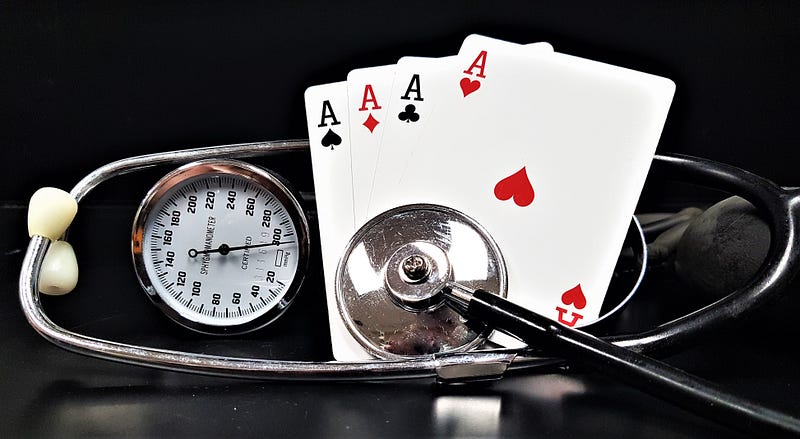Understanding the Risks: Blood Pressure Medications and COVID-19
Written on
The Myths Surrounding Blood Pressure Medications
Misinformation regarding the connection between blood pressure medications and COVID-19 has led many to take unnecessary risks with their health. Recent research challenges these misconceptions, indicating that halting treatment is not a wise choice.

The Highly Contagious Nature of SARS-CoV-2
The global outbreak of COVID-19 highlights the contagiousness of the SARS-CoV-2 virus. Although social distancing and lockdowns have mitigated its spread, misinformation continues to thrive. A new study conducted by European cardiologists offers crucial insights to counter the dangerous myth linking COVID-19 and blood pressure medications.
SARS-CoV-2 and ACE2 Interaction
SARS-CoV-2 utilizes the ACE2 protein to infect cells. A study from 2005 involving rats indicated that two common classes of blood pressure medications, ACE inhibitors and angiotensin receptor blockers, elevate ACE2 levels. This led to concerns that increased ACE2 could heighten susceptibility to the virus.
Initially, reports from China suggested that patients with high blood pressure faced a greater risk of severe outcomes from COVID-19. However, recent research led by Dr. Iziah Sama from the University of Groningen has cast doubt on the connection between blood pressure medications and increased ACE2 levels.
Examining the Data
Dr. Sama's study analyzed 2,608 men and 1,112 women with heart failure across multiple European medical centers. The findings revealed that ACE2 levels were not significantly influenced by ACE inhibitors or angiotensin receptor blockers. The impact of a third type of medication, mineralocorticoid receptor antagonists, was inconsistent. Overall, this study did not provide evidence that these commonly prescribed medications increase ACE2 levels, thus posing a higher risk of SARS-CoV-2 infection.
Exploring the Disparities
Despite the lack of evidence linking these medications to more severe COVID-19 outcomes, data show that patients with high blood pressure are 2.5 times more likely to require ICU admission and three times more likely to die. If the medications do not raise ACE2 levels, what accounts for the worse outcomes in patients using them? The answer may lie in the fact that the supposed connection does not exist.
In China, hypertension rates are alarmingly high, with nearly 25% of adults affected, rising to 50% among those aged 65 and above, and exceeding 90% in individuals over 80. However, only half of older patients with high blood pressure receive treatment, and less than 20% have their condition effectively managed. Only a quarter of patients with hypertension are treated with the medications in question.
This suggests that many older individuals suffering from hypertension may be more severely impacted by COVID-19, but the majority of those in initial studies were not effectively treated with ACE inhibitors or angiotensin receptor blockers. The low percentage of patients on these medications indicates a weak link to COVID-19 outcomes, compounded by the fact that hypertension is often poorly controlled, adding to the risk of mortality.
Misinterpretations of Previous Research
The assumption that blood pressure medications raise ACE2 levels can be traced back to the 2005 study, which indicated a correlation between treatment and ACE2 levels. However, it’s crucial to note that only one class of medication was responsible for this effect. Moreover, the study utilized rats as its subjects, and while rodent models can provide valuable insights, their results do not always apply to humans.
Extensive reviews of existing literature reveal a lack of evidence connecting ACE inhibitors or angiotensin receptor blockers to negative COVID-19 outcomes. A small study found no link between these medications and clinical outcomes in COVID-19 patients, though further research is necessary for confirmation.
Understanding Gender Differences
One notable finding from Dr. Sama's study was that men exhibited consistently higher ACE2 levels than women, regardless of treatment. Among 38 countries reporting COVID-19 rates by sex, 34 indicated that men face worse outcomes. This observation may shed light on the underlying mechanisms contributing to the gender disparities in COVID-19 severity.
The Importance of Continuing Treatment
Leading medical societies, including the European Society of Cardiology, the American College of Cardiology, and the International Society of Hypertension, strongly advise patients to maintain their blood pressure treatment. The findings from Dr. Sama's study, along with emerging evidence indicating that blood pressure medications do not adversely affect COVID-19 patients, reinforce this recommendation.
Before making the risky decision to discontinue blood pressure medications due to fears related to COVID-19, patients should weigh the evidence that suggests they are not likely to benefit from such a dangerous gamble.
Chapter 2: YouTube Insights on COVID-19 and Blood Pressure Medications
The video titled "Canlı Bahis Siteleri - YouTube" provides further insights and discussions on the implications of COVID-19 on patients with hypertension.